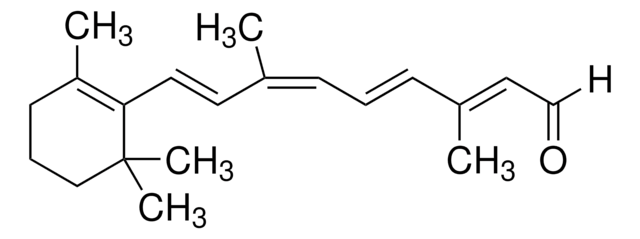17772
Retinol
≥95.0% (HPLC), ~2700 U/mg
Synonym(s):
Axerophthol, Vitamin A, Vitamin A alcohol, Vitamin A1, all-trans-3,7-Dimethyl-9-(2,6,6-trimethyl-1-cyclohexen-1-yl)-2,4,6,8-nonatetraen-1-ol
About This Item
Recommended Products
biological source
synthetic
Assay
≥95.0% (HPLC)
form
(Powder or Crystal with Lumps)
specific activity
~2700 U/mg
color
yellow to dark yellow
mp
61-63 °C (lit.)
shipped in
dry ice
storage temp.
−20°C
SMILES string
CC1(C)C(/C=C/C(C)=C/C=C/C(C)=C/CO)=C(C)CCC1
InChI
1S/C20H30O/c1-16(8-6-9-17(2)13-15-21)11-12-19-18(3)10-7-14-20(19,4)5/h6,8-9,11-13,21H,7,10,14-15H2,1-5H3/b9-6+,12-11+,16-8+,17-13+
InChI key
FPIPGXGPPPQFEQ-OVSJKPMPSA-N
Looking for similar products? Visit Product Comparison Guide
General description
Application
Biochem/physiol Actions
Unit Definition
Signal Word
Danger
Hazard Statements
Precautionary Statements
Hazard Classifications
Aquatic Chronic 4 - Eye Irrit. 2 - Repr. 1B - Skin Sens. 1
Storage Class Code
6.1C - Combustible acute toxic Cat.3 / toxic compounds or compounds which causing chronic effects
WGK
WGK 1
Personal Protective Equipment
Certificates of Analysis (COA)
Search for Certificates of Analysis (COA) by entering the products Lot/Batch Number. Lot and Batch Numbers can be found on a product’s label following the words ‘Lot’ or ‘Batch’.
Already Own This Product?
Find documentation for the products that you have recently purchased in the Document Library.
Customers Also Viewed
Our team of scientists has experience in all areas of research including Life Science, Material Science, Chemical Synthesis, Chromatography, Analytical and many others.
Contact Technical Service








